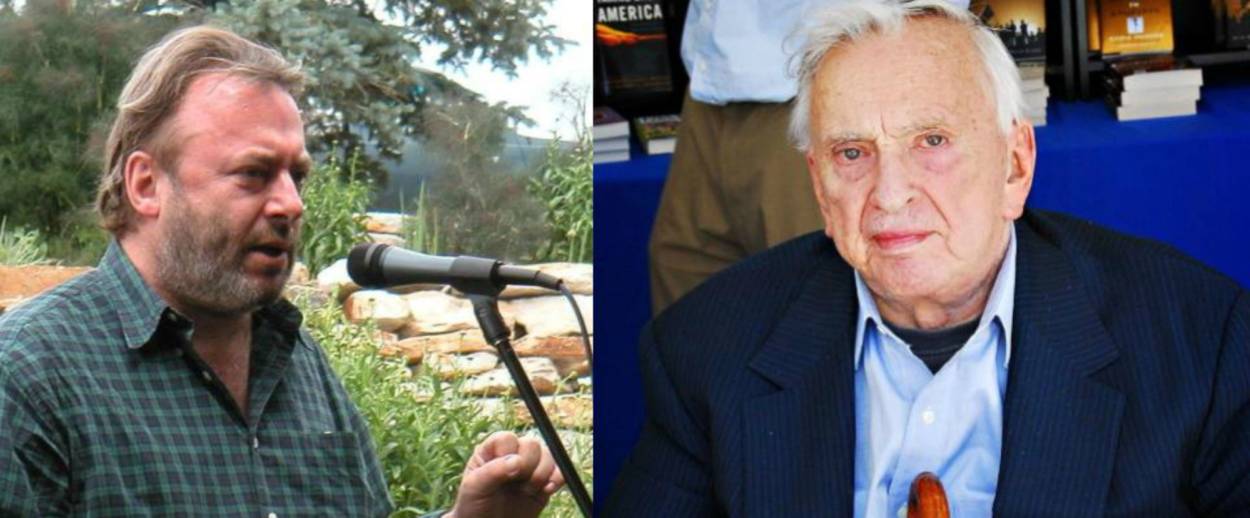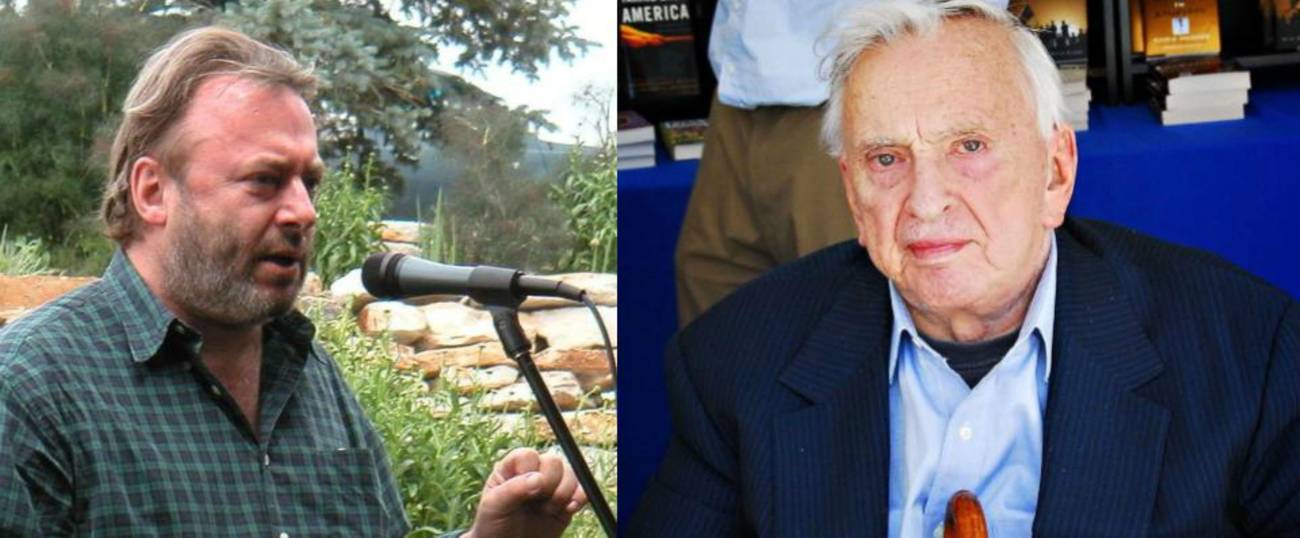A Parting of Ways
Christopher Hitchens died seven years ago this Saturday, a decade after breaking ranks with onetime friend Gore Vidal and beginning a feud that symbolized major changes in left-wing politics




The denouement came in an article in Vanity Fair in April 2010. “I have no wish to assassinate Vidal’s character,” Christopher Hitchens, who died seven years ago this month, wrote, “a character which appears, in any case, to have committed suicide.” Removing his pen from its scabbard, Hitchens contended that the once-great man of American letters had devolved into a tired old crank: a conspiracy-addled, mean-spirited author of half-baked and half-argued screeds.
That same year, when his memoir Hitch-22 hit bookshelves, Hitchens definitively repudiated the title Vidal denied having given him: that of “his living successor, dauphin, or, as the Italians put it, delfino.” It was a literary relationship that ended as a literary feud but their broken bond was also symbolic of a post-Sept. 11 split that had driven Hitchens away from the radical American left where he built his reputation and made Vidal, as Hitchens put it, “more the way he already was.”
The two writers had become acquainted while Hitchens was still writing for New Statesman in London, before his move to the United States in 1981. Though Hitchens remained quite clearly Anglo-American and Vidal was a long-in-the-tooth expatriate, they shared a critique of American imperialism and what the latter termed the national security state in-keeping with the traditions of the radical American left. In 1991, they were among the few voices opposed to America’s lead in liberating Kuwait from Iraq’s military annexation—a war Vidal likened to a light show in the Gulf for Ted Turner’s benefit.
Cracks in their relationship surfaced during the Clinton administration. In No One Left to Lie To, Hitchens attacked the Clintons’ mendacity and triangulation from the left, and, in the spirit, chided Vidal for his role as “defender of the president and a friend of the First Lady.” Vidal was also a sympathizer of Timothy McVeigh, more-or-less blaming the federal government for the Oklahoma City bombing in a Vanity Fair essay published, portentously, in September 2001.
And in that month, the end came. “We were all changed” by the events of Sept. 11, Hitchens acknowledged in his 2010 attack on Vidal. The former took a clear stand with the United States and against Islamist terrorism. This led him away from the left, parting ways with The Nation in 2002 on the basis that the magazine was “becoming the voice and the echo chamber of those who truly believe that John Ashcroft is a greater menace than Osama bin Laden,” and towards his divisive support for American intervention in Iraq.
Hitchens could well have had Vidal in mind when he wrote that final Nation column, who, after all, wrote that year in The Observer, “We still don’t know by whom we were struck that infamous Tuesday, or for what true purpose.” By then a full-throated conspiracy theorist, Vidal opposed the wars in Afghanistan and Iraq and (rather unfortunately for a man of his caliber) perpetuated the hoary argument that “the oil and gas Bush-Cheney junta” used the September 11 attacks as a pretext to build energy pipelines in the Middle East. (Vidal’s mental decline and surrender into alcoholism is well-covered in Michael Mewshaw’s Sympathy for the Devil.)
But there was more to it than politics. As Hitchens also said in his 2010 Vanity Fair piece, Vidal had “a very, very minor tendency to bring up the Jewish question in contexts where it didn’t quite belong”—which was being rather generous, in fact. Relatedly, Vidal long “nurtured an admiration in his breast for the dashing Charles Lindbergh,” the public face of the America First opposition to the Second World War who favored cooperation with Nazi Germany and accused American Jews of “agitating” for war.
Vidal was something of a patrician anti-Semite. In 1981’s “Some Jews & The Gays,” in which he referred to Jews as ‘new-class persons,’ he wrote, “No matter how crowded and noisy a room, one can always detect the new-class person’s nasal whine.” Five years later in “The Empire Lovers Strike Back,” Vidal accused Norman Podhoretz and Midge Decter of being a ‘fifth column’ in American political life whose principal concern was getting “Treasury money for Israel” for their “never-ending wars against just about everyone.”
When that unreadable piece was published in the pages of The Nation, Hitchens—who discovered in 1987 by way of his grandmother that he was Jewish and himself made the mistake of defending the Holocaust denier David Irving for far too long—went with fellow contributor Alexander Cockburn to its then-editor Victor Navasky to express their reservations. As Hitchens would later recall in his memoir, Hitch 22: “With one of the shrugs for which he was famous Victor said: ‘Well, Gore is Gore.’ This I was later to find true enough.”
Hitchens last saw Vidal at a publication party for the latter’s 2006 memoir, Point to Point Navigation. Hitchens admired Vidal, a feeling that, until September 2001 at least, was manifestly mutual, even if Vidal’s biographer, Jay Parini, portrays Hitchens as something of a courtier. The end of their bond brought Hitchens no joy whatsoever. “I looked to him as a model,” Hitchens told Parini after the Vanity Fair piece came out. “We all did.”
Since Hitchens’s death and especially since Donald Trump’s accession, I have seen it asked, ‘What would Hitchens say?’ about some new crisis or farce. (Not once have I seen this asked of Vidal. Sadly, someone who at his zenith conjured Burr and Lincoln in the most magnificent American novels has quickly faded from public consciousness.) It is an interesting hypothetical, particularly in the context of our present discussion about the American left’s future, but one that’s completely useless, for even in seven years political conditions have changed so dramatically as to make America unrecognizable.
And indeed, to use Hitchens as a crutch is in a certain sense antithetical to the way he conducted himself. In Letters to a Young Contrarian, he rejected the label ‘model’ for himself as “almost by definition a single existence cannot furnish any pattern.” But if he is a model, then it is not so much for what he thought as how he thought: someone who was not afraid of to be deemed an awkward cuss, arrogant or selfish, who argued us to “seek out argument and disputation for their own sake” for “the grave will supply plenty of time for silence.” Ask not what Hitchens would think, but rather think for yourself.
Liam Hoare is a freelance writer based in Vienna, where he is the Europe Editor for Moment and a frequent contributor to Tablet.